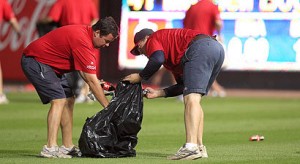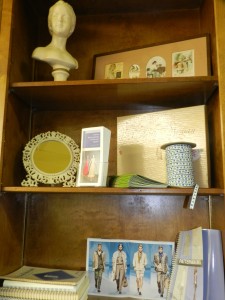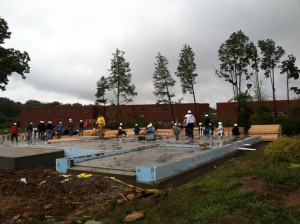by Crystal Davis | Oct 10, 2012 | News Slider
The Student Activities Center has been revving up the activity schedule for this fall with a Personal Training Crash Course. The SAC is offering free training sessions to 12 students this month. Personal training sessions for students are usually $20 per session, but Emily Harris, director of campus recreation said Lipscomb wanted to offer a special financial deal for students. “Any place you go in Nashville, it’s $50 to $80 dollars an hour. I mean it’s a steal,” Harris said about what Lipscomb is offering. “Even though $20 is a good deal, it’s still $20, and that’s hard for a college student to come up with.” “We wanted them to have that benefit of reaching their personal goals and experiencing personal training while in college,” Harris said, stressing the importance of students knowing how to take care of themselves now so they can maintain proper health as they age. “Thirty years down the road you might be like ‘Oh my gosh, I’ve gained 30 pounds. I need to lose weight! I don’t know what to do!’ Since you’ve experienced personal training in college, you won’t be freaked out to hire a personal trainer.” “You’ll remember, ‘Oh I’ve experienced that in college. It’s not what I thought it would be,’” Harris said. “It’s not like ‘The Biggest Loser’ on TV where they’re screaming at you and yelling. It’s like literally a life coach to help you reach the goals that you have.” Training sessions for participating students consist of two 30-minute workouts per week for four weeks. The certified trainers pair students with a workout partner, or if students have...

by Cory Woodroof | Oct 9, 2012 | Opinion, Sports
After a large number of Kansas City Chiefs fans cheered when their own quarterback left the KC-Baltimore Ravens game Sunday with a concussion, infuriated Chiefs offensive tackle Eric Winston decided to take a stand. Winston held a one-man press conference blasting people who expressed their joy at Matt Cassel’s expense. “We are athletes, OK? We are athletes. We are not gladiators. This is not the Roman Coliseum. People pay their hard-earned money when they come in here, and I believe they can boo, they can cheer and they can do whatever they want. I believe that,” Winston said. “We are lucky to play this game. People, it’s hard economic times, and they still pay the money to do this.” This is true. Fans pay good money for tickets. You guys make a lot of money. Why can’t I cheer for what I want, whenever I want? Not quite so, the lineman says, referring in part to the long-lasting impact of concussions on players that’s still being studied, even while some retired athletes struggle to fully function and others choose suicide over disability. “But when somebody gets hurt, there are long-lasting ramifications to the game we play. I’ve already kind of come to the understanding that I won’t live as long because I play this game, and that’s OK. That’s a choice I’ve made and a choice all of us have made.” Winston continues. “But when you cheer, when you cheer somebody getting knocked out, I don’t care who it is — and it just so happened to be Matt Cassel — it’s sickening. It’s 100 percent sickening. I’ve been in some rough times on some rough...
by Brynn Watkins | Oct 8, 2012 | Uncategorized
Shelby Shacklett always knew she wanted to be in a social club. She came to Lipscomb with social clubs in mind and chose Delta Omega. Shacklett said she knew Delta Omega was the right choice when she felt the welcoming presence of the girls in the club. “I walked in the front doors, and they were the first club that welcomed me,” she said. “The girls all immediately came up to me and were super nice. They were very complimentary to me. It seemed like they really wanted to get to know me. ” As a senior, Shacklett is still certain she has made the right choice with Delta Omega. Though she has had a great experience with the club, she talked about some changes she would love to see within the social clubs on campus. “I think we should have more of the clubs hanging out with the other clubs,” she said. “Right now, we have some clubs that just hang out with the people in their clubs. This should not be happening. I think there should be events where all the clubs get to hang out with each other and get to know one another. “I think all of the clubs should be given chances to hang out with each other, and no rivalries should be happening. Also, I would want to stop all the stereotyping within social clubs because it is just a little ridiculous and immature.”...

by Anna Marie Kandt | Oct 7, 2012 | Uncategorized
Few people outside the fashion bubble here at Lipscomb realize that the campus has a clothing lab. Perhaps it is because our fashion students are a small portion of the student body. Maybe it is due to its nearly-hidden location. To many, the clothing lab is one of campus’ best kept secrets. Alex Barry, a senior double majoring in fashion industry and textiles and apparel, is the co-president for Rho Xo Delta, Lipscomb’s fashion club. “It’s not one of those places you just stumble on,” she said, referencing the location. The clothing lab is down the hall from the computer center in the basement of the Beaman Library. “If you’re not looking for it, you won’t find it,” Barry said. Several classes actually take place in the clothing lab. These classes include Clothing Construction I and II, Art Applied to Everyday Life, Professional Orientation for Fashion Majors, Interior Fabrications and Flat Pattern Design. Sissy Simmons, a fashion professor, teaches Clothing Construction I and Art Applied to Everyday Life. According to Simmons, the Clothing Construction I class “uses every aspect of the lab.” The students use the tables when she is lecturing, the sewing equipment and cutting tables when sewing, the storage space for projects and supplies, the mannequins to display finished looks and the great selection of fabrics to make these looks. Professor Simmons also uses the Halston drawings and donated garments in the lab as references throughout her classes. The clothing lab has been upgraded recently by acquiring new audio/video equipment. Simmons believes that “[the new equipment] has allowed us to go beyond the classroom, referencing people, places and...

by Emily Snell | Oct 6, 2012 | News Slider
Rain clouds and chilly winds were no match for the warm heart of Paul Manyok Saturday morning, Oct. 6, as a crew of Habitat for Humanity volunteers began building a new house for him and his family. Manyok, a 2011 Lipscomb graduate, is one of the Lost Boys of Sudan creating a new life for himself in Nashville. He came to the United States in September 2003 and became a U.S. citizen in 2008. With his new home Manyok will be able to offer his three young daughters something he didn’t experience as a child: safety. “I’m very excited,” Manyok said, explaining the significance of the day. “It means a lot to me—security and safety for my children, somewhere where they can play, a place to call home.” At age 5, Manyok fled, with other Lost Boys, from the violence of civil war ravaging his home nation. The Lost Boys Foundation reports that 20,000 young boys left their families and homes in South Sudan in 1987. “Wandering for years, they walked more than a thousand miles, half of them dying before reaching a Kenyan refugee camp,” the Foundation’s website explains. According to the Foundation, at least 150 of the Lost Boys have made the Nashville area their new home. Despite shivering in the chilly 46-degree weather, Elizabeth Manyok, Paul’s wife who is also Sudanese, wore a beaming smile as she waited on the street in front of where her family’s home will stand. Using her husband as a translator, she shared her appreciation. “I thank Habitat for Humanity, Wells Fargo bank, THDA and all of the volunteers that have...



